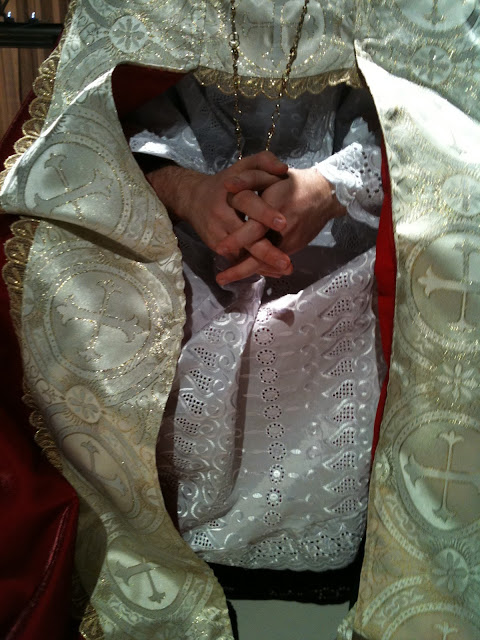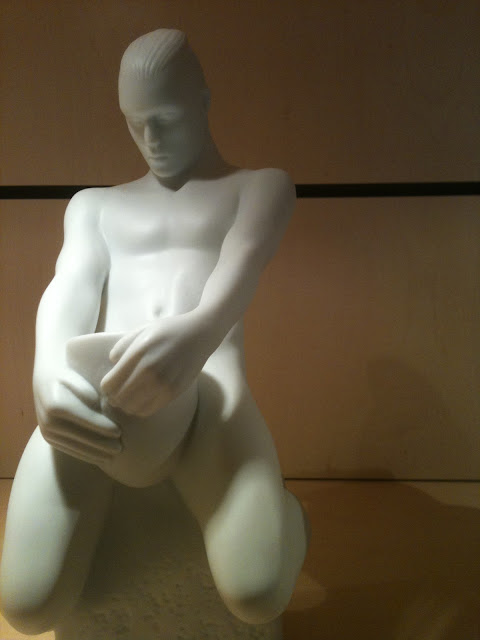Sunday, November 27, 2011
Burning
Just came back from NYC, which is always a pain in the ass. But worth it to see Thomas Bradshaw's Burning at the Acorn Theatre. Wow. What an amazing, provocative, seething mess of a play: so ambitious and enthralling and fascinating. I really felt like I was seeing a whole new type of play. First of all, I can't even believe it was produced, at all: a new play with 13 roles that includes scenes of incest, murder, graphic sex and violence and neo-Nazis talking about the importance of fiber in your diet? I kept wondering what theatre in Boston would be brave enough to produce this play before anyone else, and the answer, sadly, was NONE OF THEM. Never mind the subject matter or the endless nudity and simulated butt-fucking required of the cast: it wouldn't get past the "new play with 13 roles" part. To be fair, I don't think the play could really be produced anywhere BUT New York. It's the only city where the audience wouldn't all walk out or try to burn the theatre down (and there were walk outs, believe me.)
So, I hate to admit it, but: you win New York. Again.
Man, this was crazy, risky, insane theatre. It talked about race and sexuality and queerness in ways that theatre just hasn't yet. It reminded me of Sarah Kane, but where her language is poetic and heightened, Bradshaw's is completely mundane, even awkward, which makes the shocking nature of the scenarios even more strange and ugly: two gay men casually inviting their adoptive son into a menage a trois; a neo-Nazi engaging in mastrubation with his creepy, paralyzed 16-year-old sister in a bath tub. Lots and lots of anal sex. Themes of exploitation and internalized racism and the commercialization of art, all piled on top of each other and bending back and forth between the 1980s and the present.
If you are in New York, go see this play. Really.
Addendum: I just got my copy of American Theatre, and the complete text of Bradshaw's "Ashes" is included. "Ashes" appears to be a play that became part of "Burning": the story surrounding Neo-Nazis and a black artist in Berlin.
Sunday, November 20, 2011
The Balcony Mix
So many people asked for this after the show, so here it is:
The Balcony Playlist:
Untouched by The Veronicas
Dancing On My Own by Robyn
John the Revelator by Depeche Mode
Oh La La by Goldfrapp
My Body is a Cage by Arcade Fire
Rocket by Goldfrapp
Sunshine, Lollipops by Leslie Gore
Bolero by Pink Martini
Paper Planes by MIA
I Like It Rough by Lady Gaga
Satin Chic by Goldfrapp
Voice Thing by Goldfrapp
and, of course
Bulletproof by La Roux
A great mix for parties, funerals, faux-funerals, and everything in between!
I want you to see The Balcony, of course...
...BUT if you've already seen it, there's two great shows you should catch before they close tomorrow as well.
The rarely produced Dr. Faustus, at Suffolks' Modern Theatre, directed by my good friend David Gammons
and
Angel Reapers, right next door at the Emerson Paramount.
I won't be able to see Angel Reapers, which kills me: my friend Birgit is in it, and I hear it's just phenomenal.
A million years ago, Birgit and I were Orphelia and Hamlet in Rosencrantz and Guildenstern are Dead at the New Rep.
Time really does fly.
Or sail.
And if you HAVEN'T seen The Balcony yet: well, I hope you will! It's our last performance tomorrow, at 2pm.
Hope to see you!
Thursday, November 17, 2011
The Balcony - Opening
The Balcony – A synopsis
In a brothel named The Grand Balcony, the clients act out fantasies of sex and power with the prostitutes. The Madame who presides over this “house of illusions” is named Irma. Among her clients are a man who dresses as a Bishop, another who impersonates a Judge, and a third mimics a General. A fourth client, The Slave, enacts a scenario of extreme degradation. Outside the walls of the brothel, a violent revolution rages. One of Irma’s prostitutes, Chantal, escapes the brothel and joins the insurgents, for whom she becomes a symbol of Liberty. The revolution is led by Roger, Chantal’s lover.
Meanwhile, in Irma’s office, Irma and her assistant Carmen wait anxiously for the real controller of power in the country to arrive: Irma’s lover, the Chief of Police. Irma dispatches Arthur, a gigolo who plays the Executioner in the brothel , to find him. But the Chief of Police appears just after Arthur leaves. The Chief of Police yearns to have his image replicated in the brothel because then and only then will he truly have domination over the minds of the people.
As the revolution reaches a boiling point, the Royal Palace is destroyed and the mysterious and remote Queen and her dignitaries are all killed. An Envoy from the Palace arrives at the brothel and persuades the clients to portray their fantasy roles in earnest, with Irma assuming the role of the Queen. These new leaders appear on the Balcony of the brothel and are cheered by the crowd. Chantal appears on the Balcony with the Queen and is shot by an unknown assassin. Order is restored.
The revolution quelled, the Chief of Police still yearns to have someone impersonate him in the brothel. He has rejected the executioner’s red coat and axe as a symbol of his power, and now wants to be represented by an enormous phallus. Finally, a new client appears to act out the fantasy role of the Chief of Police. It is Roger, leader of the failed Revolution. He engages in a fantasy of power and cruelty, and then castrates himself. The Chief of Police takes Roger’s place in the Tomb, where he enshrines himself for eternity. Irma dismisses the Bishop, Judge and General as though there were mere clients and advises the audience to “prepare their roles”. She prepares herself for another day of work as the sounds of a new rebellion begin to emerge from outside.
Labels:
boston Conservatory,
jean genet,
John Kuntz,
the balcony
The Balcony - Dress Rehearsal
Bastard. Thief. Prostitute. Iconoclast. Homosexual. Anarchist. Vagabond. Prisoner. Jean Genet is probably one of the most provocative, enigmatic and scandalous playwrights to have ever lived.
Abandoned by his mother as a baby in Paris in 1910, Genet spent most of his life in and out of French prisons for petty crimes. He was, meanwhile, one of the hottest and most respected novelists and playwrights of his time, revered by French intellectuals such as Jean Cocteau and Jean Paul Sartre (who would later save him from a sentence of life imprisonment).
A tale from Genet’s childhood describes how he was accused of stealing. He was innocent of the crime, but was punished for it anyway. This early incident would lead to lifelong obsessions with crime, justice, power, the corruption of authority, the hypocrisy of society, the specter of totalitarianism, and the continuous battle between illusion and reality. Indeed, one is not even sure that this early story of false accusation actually occurred, or was just another part of an elaborate personal mythology created by Genet himself.
Written in 1957 and first produced in London in 1959, The Balcony is considered by many to be Genet’s theatrical masterpiece. Set in a fantastical brothel where the clients act out elaborate power-based fantasies with its whores while a revolution smolders outside, The Balcony’s early productions caused both scandal and outrage. Genet himself leapt onstage during rehearsals of its London premiere and had to be forcibly removed from the theatre. The production, he insisted, needed to be “vulgar, violent and in bad taste” and assured the director, Peter Zadek, “if anybody tells you that you have produced this play in good taste, you will have failed. My tarts must look like the worst prostitutes in the world.” At the same time, the scenes in the brothel needed to be presented “with the solemnity of a Mass in a most beautiful cathedral.” Martin Esslin, in his classic work, The Theatre of the Absurd, concurs: “[The Balcony] illuminates the essence of Genet’s whole approach – the deep inner tension arising from his search for something absolute, beautiful, a sacramental element in an inverted system of values in which evil is the greatest good, and the beautiful blooms in a soil of excrement and sordid crime.”
While I have always been fascinated and inspired by this play’s history, I have attempted to approach The Balcony as a brand new play. The surveillance systems of the brothel are contemporary, the music is pop, the clothes echo a fashion runway, the gender of The General (typically a male role) has been reversed to mirror a world where women may also be powerful and where anyone might be exploited. The brothel itself resembles a blasted sound stage on which many images may be projected, magnified and distorted. The idea of revolution - and whether one is possible in a mind-controlling world of TV, fast food and iPhones - is quite resonant. Themes of corruption, power and greed seem fresh in a country where a small percentage of the population possesses the majority of its wealth.
At the same time, I tried to remain true to Genet’s notion that everything – both onstage and off - is false. The meta-theatricality of the play remains intact and – I hope - goes beyond the stage and into the audience. There is nothing safe here, and I hope you will be provoked and challenged as well as entertained by The Balcony.
I have also tried to adhere to Genet’s sense of dream-like absurdity: these characters are non-realistic; abstractions and symbols of power and desire. Thus we have a “Fluid Ballet” of Blood, Tears and Sperm (imagined from an earlier draft of the play that Genet rewrote), enormous phalluses, and guys running around in furry costumes.
The world that Genet has created – to put it tersely – is weird.
Beautifully, poetically, disturbingly weird.
We have tried to embrace that weirdness.
(These are my notes for the program. We open tomorrow! Very excited.)
Monday, November 14, 2011
The Balcony - Tech
We've spent the last 24 hours or so in tech for The Balcony. Here's some pics. Beautiful set by Christina Todesco. Beautiful Bishop costume by Gail Buckley. Insanely gorgeous lighting by Jeff Adelberg.
Thursday, November 10, 2011
The Balcony - Images
When I knew I was going to direct The Balcony, I started amassing and taking pictures of what I thought might be in this weird world of Genet's brothel. Here are a few. We go into tech this weekend!
Subscribe to:
Posts (Atom)






























































